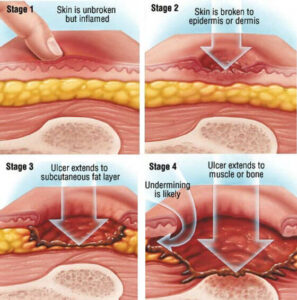 Pressure ulcers, commonly known as bedsores, are a significant concern for individuals with limited mobility or those confined to bed for extended periods. Among the various stages of pressure ulcers, unstageable pressure ulcers pose specific challenges and complexities. Understanding their nature, causes, and effective management is crucial for both healthcare professionals and individuals at risk.
Pressure ulcers, commonly known as bedsores, are a significant concern for individuals with limited mobility or those confined to bed for extended periods. Among the various stages of pressure ulcers, unstageable pressure ulcers pose specific challenges and complexities. Understanding their nature, causes, and effective management is crucial for both healthcare professionals and individuals at risk.
Pressure Ulcers 101: A Brief Overview
Pressure ulcers result from prolonged pressure on the skin, often over bony prominences, restricting blood flow and causing tissue damage. They typically develop in areas like the heels, sacrum, hips, and elbows.
Factors Contributing to Sustainability
Importance of Accurate Assessment: Accurate assessment is foundational for effective pressure ulcer management. Healthcare professionals must evaluate the ulcer’s size, depth, and the extent of tissue involvement.
Causes and Risk Factors: Immobility, poor nutrition, dehydration, and compromised blood circulation are common contributors to pressure ulcers. Understanding and addressing these factors are crucial for prevention.
Recognizing Unstageable Pressure Ulcers
Unstageable pressure ulcers present a unique challenge as their depth cannot be visualized, hindering classification into traditional stages. These ulcers are typically covered with slough or eschar, making it difficult to assess the wound bed.
Treatment Approaches
Debridement: Removal of necrotic tissue or eschar is essential to facilitate healing. Debridement can be achieved through various methods, including surgical, enzymatic, or autolytic.
Infection Control: Unstageable ulcers are susceptible to infection. Proper wound care, including antimicrobial dressings, helps control and prevent infections.
Moist Wound Healing: Maintaining a moist wound environment promotes healing. Specialized dressings can aid in moisture balance and support the body’s natural healing processes.
Prevention Strategies
Positioning and Repositioning: Regularly changing positions and using support surfaces reduce pressure on vulnerable areas.
Nutrition and Hydration: Adequate nutrition supports tissue repair. Proper hydration is essential for maintaining skin integrity.
Skin Inspection: Regularly inspecting the skin for signs of redness or breakdown enables early intervention.
Contact DFW Wound Care Center for Expert Treatment
If you or a loved one is dealing with unstageable pressure ulcers, timely and expert care is essential. Contact DFW Wound Care Center, where our skilled team utilizes advanced wound care techniques at multiple locations, including Plano, Lewisville, Irving, and DeSoto. We are dedicated to providing personalized and effective treatment to address the unique needs of each patient. For immediate assistance, schedule an appointment through our online contact form or call one of our convenient clinic locations. Regain comfort and wellness with the specialized wound care expertise at DFW Wound Care Center.
Contact us
Schedule an appointment
with our specialists by contacting us or calling our:
